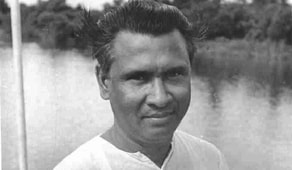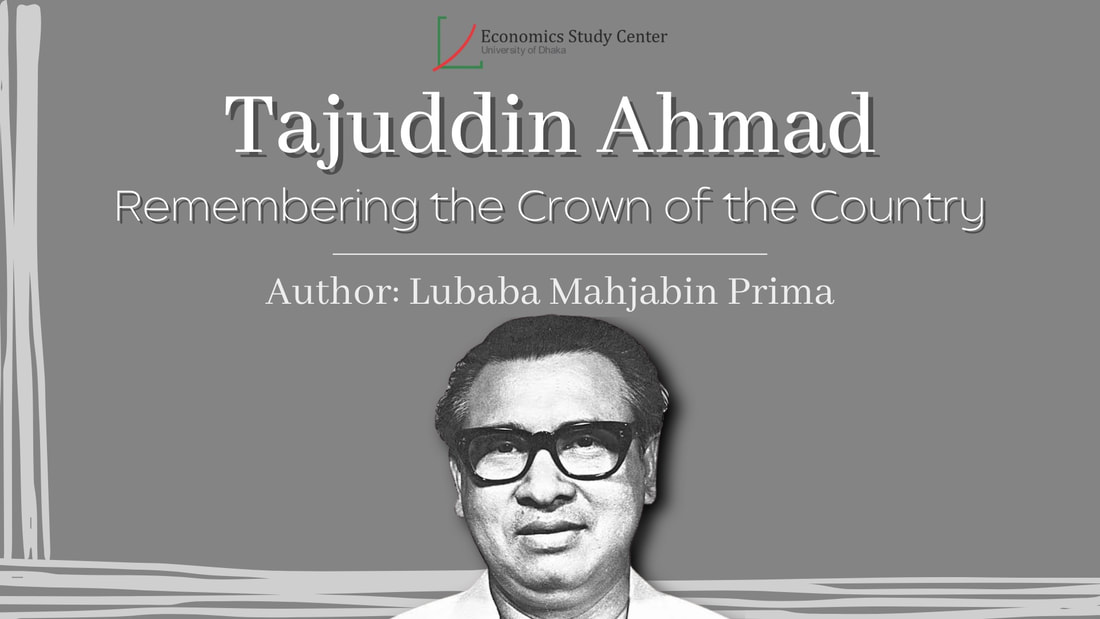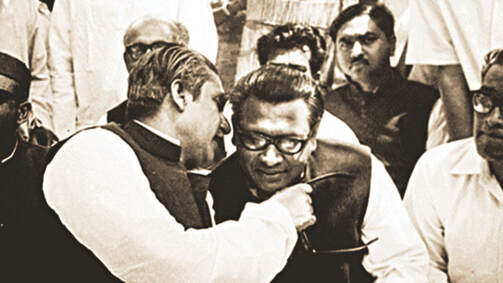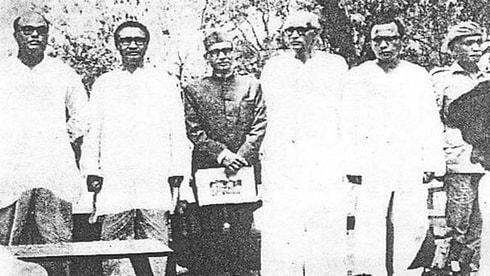ECONOMICS STUDY CENTER, UNIVERSITY OF DHAKA
|
Lubaba Mahjabin Prima "The most dangerous man in the Awami League is Tajuddin", said Zulfikar Ali Bhutto to General Yahya Khan as the latter prepared to travel to Dhaka in mid-March 1971 for meetings with Bangabandhu Sheikh Mujibur Rahman and other Bengali leaders. What scared the brutal Pakistanis was the indomitable spirit and acumen of one of the greatest leaders in the history of Bangladesh, Tajuddin Ahmad. Today marks his 96th birth anniversary. The first prime minister of Bangladesh and one of her brightest sons, was a student of the Department of Economics, University of Dhaka. He obtained a BA with honors in Economics in 1953. The Odyssey begins: Tajuddin Ahmad passed matriculation in 1944 from St. Gregory's High School in Dhaka and IA in 1948. He started his political activism at a very early age on the backdrop of the last days of British India, in Bengal which was battered with famines, communal tensions, and was a hotbed of anti-British activism. Tajuddin Ahmad joined the Muslim League in 1943. He rejected Muslim League's conversative party line and was among the first generation of Dhaka's pro-democracy, secular activists. Tajuddin joined Gano Azadi League, a civil rights organization, in July 1947. In contrast to Muslim League, the organization took progressive views on many issues, like language and education.  Contribution to Language Movement: During his university days, Tajuddin Ahmad, a resident of Fazlul Huq Muslim Hall, was closely involved in student activism within the university. He was elected member of the Jubo League executive committee at the first annual council of the Jubo League in 1951. As its member, he actively participated in the Language Movement in 1952. University State Language Action Committee was set up by the students of Dhaka University to advance the ‘Bengali as a state language’ cause in early 1951. Tajuddin got elected a member of the committee. The movement reached its peak in 1952 when on 21 February 1952, police shot fire on protests at various places, killing several of the protesters. Police would raid Jubo League's office on 21 and 22 February; Tajuddin barely avoided arrest. As an aftermath of the movement, the government conceded and Bengali was also granted the status of the state language. His contribution to the organisation of the protests and the movement is immensely significant. Tajuddin and Jukta Front: Tajuddin joined Awami Muslim League in 1953 and when the Awami Muslim League participated in the 1954 East Pakistan Provincial Assembly election in coalition with some other parties (as the legendary Jukta Front), Tajuddin won the election from his constituency defeating the then General Secretary of East Pakistan Muslim League, Fakir Abdul Mannan, by an overwhelming proportion of 3 to 1 vote. Though Jukta Front won a majority in the election, within months of taking office, the Jukta Front cabinet was dissolved by the central government on the pretext of conspiracy of secession by its Chief Minister A. K. Fazlul Huq. Tajuddin got arrested after that. But that could not destroy his zeal. Taking the law examination from prison, Tajuddin earned a BA degree in Law. After the end of his imprisonment, he was elected as the Social Welfare and Cultural Secretary of Awami League in 1955. He again got arrested, in 1958, just after Ayub Khan took over and was imprisoned for a year. The Greatest Duo and the tumultuous 60s: In Awami Muslim League, Tajuddin got intimate with Sheikh Mujibur Rahman whom he knew since his Muslim League days. Gradually after 1964, Mujib's influence in Awami League only increased with Tajuddin as his 'right-hand man'. Prior to a meeting with President Ayub Khan in January 1966, Tajuddin, close confidante of Mujib by then, drafted several demands in the interest of East Pakistan as a number of specific points, precursor of the historic six-points demands. In its essence, the six points called for a new Constitution, ensuring autonomy of provinces on key matters like monetary policy and defense instead of the prevalent absolute central governance. Promulgated by Awami League, six-points became the voice of the East Pakistani people, their charter of emancipation but got little support in West Pakistan where the military junta and the West Pakistani political parties viewed six-point as a threat to Pakistan's unity. The Ayub administration was determined to suppress six points by any means. Awami League workers, already being brutally oppressed, came under even greater persecution. Tajuddin himself got arrested in 1966. Tajuddin's Six-Points demands are often called the Freedom Charter of Bangladesh, for it clearly highlighted the economic and political repression we faced under the Pakistani regime. It made people aware of the brutality and gave them hopes of a better, independent life. In 1968, when Tajuddin was still in prison, Sheikh Mujib and some others, mostly East Pakistani military officials, were arrested on charges of high treason in the infamous Agartala Conspiracy Case. But soon a mass popular uprising erupted and the Ayub regime started to show signs of compromise. Eventually when the government started releasing prisoners, Tajuddin Ahmad was released. On 17 February 1969, he joined other Awami League leaders on their flight to Rawalpindi in order to negotiate Mujib's release. The Ayub government eventually conceded and at last, Sheikh Mujib, the unanimous leader of East Pakistan, got released from prison on 23 February 1969. Eventually, Ayub Khan resigned and the new President Yahia Khan promised a general election, the first to be held in the history of Pakistan. The First General Election of Pakistan: In the first general election of Pakistan, Tajuddin ran for and got elected from his constituency. During the Mujib-Yahya talks when Awami League refused to compromise implementing the Six Points demands, Tajuddin was present. But as the Pakistani regime refused to hand over power, the non-cooperation movement started in East Pakistan, of which Tajuddin Ahmad was one of the leading organisers. On 15 March, Tajuddin, as the General Secretary of Awami League, issued 35 directives to the people. Tajuddin and Kamal Hossain also met Yahya Khan's legal experts to sort out the difficulties regarding lifting the martial law. However, soon it was 25th March, the darkest hour of our history. Formation of Mujibnagar Government: On the night of 25 March when the Pakistani army started its genocide, Tajuddin and his trusted long-time comrade Amir-ul Islam left home, leaving their families behind, and went into hiding for the next day. They secretly left Dhaka on 27 March for neighboring India. They initially had meetings with the BSF command and then left for Delhi on 1 April. He met Prime Minister Indira Gandhi on 4 April. On their second meeting the next day, Gandhi informed him about Sheikh Mujib's arrest and asked about the Bangladesh government. He replied, as consulted with Amir-ul Islam the day before, that a provisional government has been formed, with Sheikh Mujib as its president and other senior Awami League leaders who attended the Mujib-Yahya talk as cabinet members. As all other members' whereabouts were unknown until then, Tajuddin presented himself as the Prime Minister of the Government. At that meeting, India agreed to open its borders for Bangladeshi refugees and to allow the Bangladesh Government to operate within Indian territories. The Indian government also promised to assist the liberation war of Bangladesh by all possible means. This meeting is perhaps one of the most important meetings of our history. Not only did it save millions of lives, but also ensured that Bangladesh can run its war efficiently and legitimately. However, some Awami League leaders were not happy with the idea of the new government and proposed alternatives. Tajuddin, however, remained committed to the idea of provisional government believing that only a legitimate government can muster the necessary international support. He also took measures to reunite the Awami League leaders. Eventually the leaders were united and they reached a conclusion about their roles during the war. Soon, the government took its oath on 17 April 1971, at Baidyanathtala. While answering a journalist during the ceremony, Tajuddin named the place Mujibnagar, after Sheikh Mujibur Rahman, the capital of Bangladesh until victory. Later the government-in-exile came to be popularly referred to as the Mujibnagar Government. Tajuddin also convinced the then Deputy High Commissioner of Pakistan in Kolkata, Hossain Ali, to switch allegiance to the Bangladesh government along with his Bengali staff. Ali along with 70 other employees at the Deputy High Commission swore allegiance to the Bangladesh Government and overturned the Pakistan High Commission on 9 Circus Avenue into the Bangladesh Mission in Kolkata for good. The mission would also house part of the government offices including the Ministry of Foreign Affairs. This was a crucial step for gaining international support and retaining order in such a state of turmoil. The Great War and the Great Leader: After Operation Searchlight, military personnel, unaware of Tajuddin's development in Delhi, formed Bangladesh Forces (BDF) under the command of Colonel Osmani. Among the Tajuddin Government's top priorities was coordinating these war efforts. His support was vital for Osmani in maintaining the Bangladesh Army as a professional body out of direct political influence. When BDF faltered due to lack of manpower and coordination, there was conflict among officers regarding the next step. However, Tajuddin intervened and made sure that the discussion continued. The resolutions reached provided crucial guidance and set a course for the conduct of war in the upcoming months. Having him as Prime Minister, many Bengali bureaucrats, diplomats and military officers serving Pakistan defected to the new Government of Bangladesh. Thus, Bangladesh was able to establish a civil administration and Tajuddin made sure that the administration was not politicised. He also commissioned economist Rehman Sobhan to prevent the economic advisor to the Pakistani President Yahya Khan, economist M M Ahmad, from acquiring fresh foreign aids for Pakistan. Tajuddin Ahmad also convinced many Bangladeshi officials working at Pakistani foreign missions to switch allegiance to Bangladesh. Economist Professor Rehman Sobhan, recalls: "... Tajuddin Ahmad was quite as fertile in his contributions as any of the academics demonstration deep political insight dialectical skill and an extraordinary capacity to absorb and break down complicated technical issues to their basic essentials." By August, Khondaker Mostaq Ahmad and his cohorts secretly established a liaison with the United States, a key ally to Pakistan, without the Government's knowledge. Sheikh Mujib was under trial in Pakistan and the group spread the 'either freedom or Mujib' doctrine. After getting the information from Indian intelligence agencies, Tajuddin took strict action. He removed Mostaq from the Bangladesh delegation to United Nations General Assembly. Later in December, after the war, he sacked him. Just after independence, the Time magazine made the following remark about Tajuddin: "Tajuddin Ahmad, 46. Prime Minister, a lawyer who has been a chief organizer in the Awami League since its founding in 1949. He is an expert in economics and is considered one of the party's leading intellectuals." Rebuilding the country: After returning to Bangladesh on 22 December, he quickly embarked on the immediate task of restoring law and order. The cabinet was reformed with Sheikh Mujib as Prime Minister and Tajuddin as the Minister of Finance and Planning. He was also a member of the committee which was in charge of drafting the Constitution of Bangladesh. As minister of finance, he had strong resentment against foreign aid. He particularly didn't like when it came from the United States or the World Bank, which he considered to be a tool of the United States' domination. He presented the first Bangladesh National Budget in 1972. His declaration of the nationalization of industries came under strong criticism. It was said that there will be a lack of manpower, but he rebutted stating that if private enterprises can find manpower, public ones can find too in the same country. He then imposed policies accordingly. Economist Nurul Islam, then Deputy Chairman of the Planning Commission of Bangladesh remarks about him: "I had known and worked closely with Tajuddin before and after independence. He was not only a patriot but also in my view the most serious-minded, conscientious and competent as well as the most hardworking among the Ministers. Tajuddin used to take the views of the Planning Commission seriously and strongly supported them whenever he was convinced during Cabinet discussions. The entire Planning Commission had great respect for him." Last Days of the Maestro: Tajuddin gradually became distant from Mujib and Awami League over numerous issues and on 26 October 1974, he resigned from the cabinet. After his resignation, he remained largely inactive in politics. After the assassination of Sheikh Mujib and his family, Tajuddin was immediately placed under house arrest. On 22 August, Tajuddin and other senior Awami League leaders were arrested and sent to Dhaka Central Jail. On 3 November, another coup was staged by another faction of the army. On that day, under the instruction of President Mostq, Tajuddin and the other three imprisoned leaders were killed inside the jail. In the history of Bangladesh, this day is infamously known as "Jail Killing Day". It is impossible to describe Tajuddin's contribution to Bangladesh in words. The great leader dedicated his entire life for the emancipation and development of Bangladesh. While the entire country loves this man dearly, we can proudly say that he's one of us. Author
1 Comment
Mahadi Hasan
7/24/2021 04:41:00 pm
The brightest leader ever we know for freedom Bangladesh. His killing ruined the proper plan of a successful country
Reply
Leave a Reply. |
Send your articles to: |




